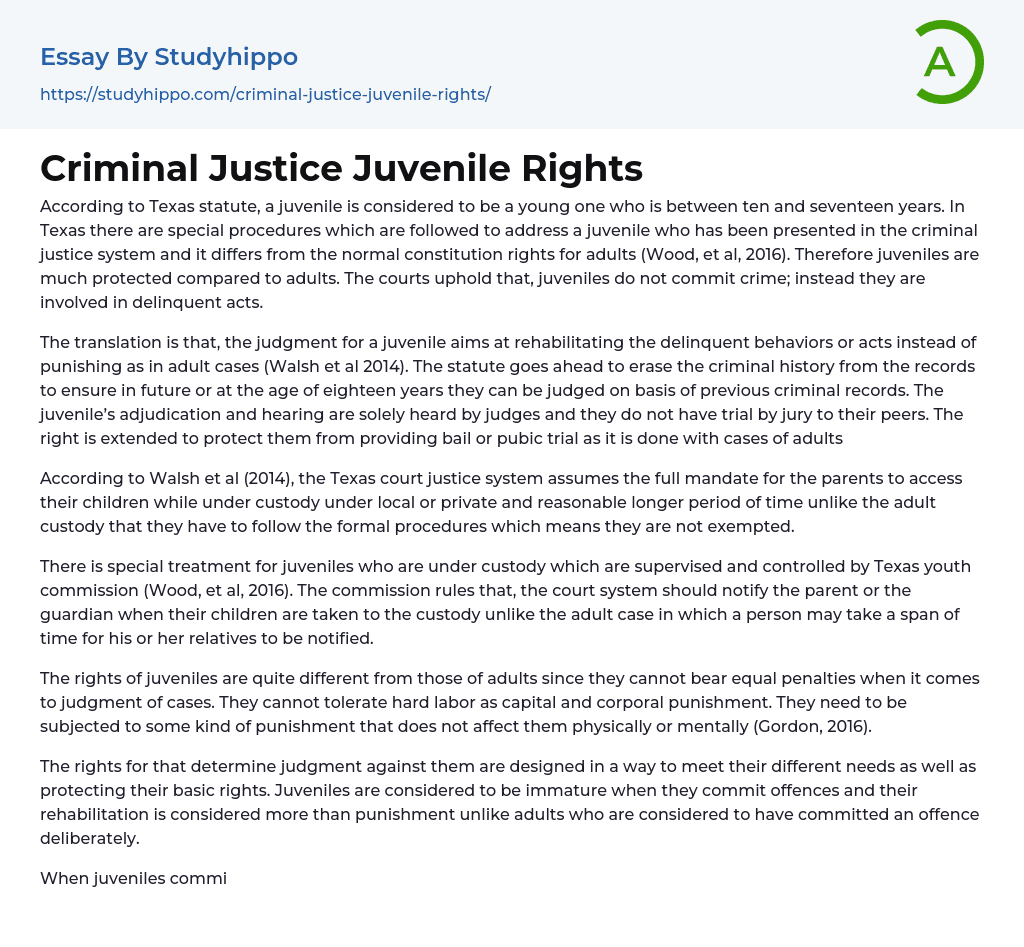As per Texas law, a juvenile is someone aged between ten and seventeen. In Texas, there are distinct procedures for dealing with juveniles in the criminal justice system, which vary from the rights given to adults (Wood, et al, 2016). Consequently, juveniles receive more protection than adults. The courts argue that juveniles do not commit crimes but rather engage in delinquent behaviors.
According to Walsh et al (2014), the text conveys that when it comes to minors, the emphasis is on rehabilitating their delinquent behavior rather than punishing them, in contrast to adult cases. Additionally, the law ensures that their criminal history is expunged from records so they can be evaluated solely based on past behaviors once they turn eighteen. Unlike adults, juveniles have their cases heard by judges instead of juries and are exempt from posting bail or un
...dergoing a public trial. In Texas, parents are granted complete access to their children while in custody for a longer duration and through local or private methods, unlike the formal procedures followed for adult custody where parental access is limited (Walsh et al 2014).
The Texas youth commission (Wood, et al, 2016) has established special treatment for juveniles who are under custody. It is mandated by the commission that the court system must inform the parent or guardian promptly when their children are taken into custody. This is unlike the situation with adults where it may take a considerable amount of time before relatives are notified. Juveniles have different rights compared to adults and they cannot receive the same penalties in court judgments. They are not subjected to hard labor or capital and corporal punishment.
Gordon (2016
suggests that juveniles should receive a punishment that does not cause physical or mental harm. The judgment for juveniles focuses on their unique needs and safeguards their fundamental rights. Unlike adults, who are considered to have intentionally committed crimes, juveniles are seen as immature and in need of rehabilitation rather than punishment. Consequently, when juveniles commit offenses, the police may opt to issue warnings or cautions depending on the seriousness of the offense.
The reasoning behind this approach is centered on the idea that children lack sound judgment and can easily be influenced by peers or family backgrounds (Gordon, 2016). However, the severity of the offense determines whether they are given a mere warning, placed in custody, or left alone. In contrast, adults seldom receive warnings and are usually taken directly to court without any negotiations. According to Gordon (2016), the circumstances and quality of life that juveniles experience also affect the judgments they receive, granting them different rights compared to adults. It is considered unfair to indiscriminately punish juveniles without taking into account the conditions they face, especially when their actions may be driven by a need for self-protection.
They may require assistance or support, and when provided, they undergo significant transformations. Unlike juveniles, adults are not given the same level of priority for their well-being and are often regarded as capable of making sound decisions to resolve their own issues.
- Bill Of Rights essays
- Civil Liberties essays
- First Amendment To The United States Constitution essays
- Fourth Amendment To The United States Constitution essays
- Second amendment essays
- Affirmative Action essays
- Assisted Suicide essays
- Capital Punishment essays
- Censorship essays
- Child Labour essays
- Child Protection essays
- Civil Rights essays
- Corporal Punishment essays
- Death Penalty essays
- Empowerment essays
- Euthanasia essays
- Gay Marriage essays
- Gun Control essays
- Human Trafficking essays
- Police Brutality essays
- Privacy essays
- Sex Trafficking essays
- Speech essays
- Animal Cruelty essays
- Charles Manson essays
- Crime Prevention essays
- Crime scene essays
- Criminal Justice essays
- Criminology essays
- Cyber Crime essays
- Damages essays
- Detention essays
- Distracted Driving essays
- Drug Trafficking essays
- Drunk Driving essays
- Forensic Science essays
- Gang essays
- Hate Crime essays
- Homicide essays
- Identity Theft essays
- Juvenile Crime essays
- Juvenile Delinquency essays
- Juvenile Justice System essays
- Law Enforcement essays
- Murder essays
- Organized Crime essays
- Penology essays
- Piracy essays
- Prison essays
- Property Crime essays




